|
|
|
Sort Order |
|
|
|
Items / Page
|
|
|
|
|
|
|
| Srl | Item |
| 1 |
ID:
088408
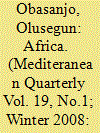

|
|
|
|
|
| Publication |
2009.
|
| Summary/Abstract |
This essay by Olusegun Obasanjo, former president of Nigeria, examines the challenges (AIDS, poverty, and governance) and opportunities (receptive investment climate, increasing democratization process, and a new framework for development) that African countries must deal with and the rest of the world respond to. The author asserts that Africa must engage the world community if it is interested in harnessing the full potential of its resources, as well as enjoying maximum output. The author argues that Africa is a friendly and profitable arena for investment and is moving away from corrupt and often mismanaged public sectors and toward good governance.
|
|
|
|
|
|
|
|
|
|
|
|
|
|
|
|
| 2 |
ID:
115714
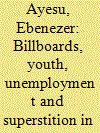

|
|
|
|
|
| Publication |
2012.
|
| Summary/Abstract |
On a sunny day in May 1983 a section of the youth of Mamfe-Akuapem in south-eastern Ghana - reeking heavily of alcohol and marijuana, armed with machetes and pick-axes and angrily singing war songs, drumming and dancing - went to the residence of Nana Ama Ansaa Sasraku III, their queen mother. Their mission was very simple. They were to inform her of their plans to demolish the billboard which welcomed motorists and visitors on their arrival in the town. According to them, the billboard was inhabited by an evil spirit responsible for the general incidence of unemployment and the absence of development in the town.
|
|
|
|
|
|
|
|
|
|
|
|
|
|
|
|
| 3 |
ID:
147104
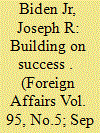

|
|
|
|
|
| Summary/Abstract |
The next administration will take the reins of American foreign policy in a world that is more complex than at any point in our modern history, including the twilight of the Cold War and the years that followed the 9/11 attacks. But it is also the case that despite the proliferation of threats and challenges—some old, some new—by almost any measure, we are stronger and more secure today than when President Barack Obama and I took office [1] in January 2009. Because of our investments at home and engagement overseas, the United States is primed to remain the world’s preeminent power for decades to come. In more than 40 years of public service, I have never been more optimistic about America’s future—if only we continue to lead.
|
|
|
|
|
|
|
|
|
|
|
|
|
|
|
|
| 4 |
ID:
122136
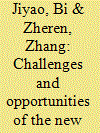

|
|
|
|
|
| Publication |
2013.
|
| Summary/Abstract |
The global economy has entered a new round of adjustment characterized by changes in the mode of growth, industrial setup, governance and monetary system. Such adjustment has brought about both rare opportunities and challenges that have to be properly addressed.
|
|
|
|
|
|
|
|
|
|
|
|
|
|
|
|
| 5 |
ID:
163327
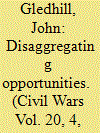

|
|
|
|
|
| Summary/Abstract |
In studies of armed conflict and civil war, it is common to distinguish between explanations that focus on the motives of insurgents and accounts that examine opportunities for rebellion. But what do scholars actually mean by ‘opportunities’? Some invoke the concept when referring to contexts in which states cannot suppress rebellion. For others, opportunities exist where insurgents have access to resources that facilitate the realisation of collective violence. And a third group refers to opportunities when discussing both of the above contexts. Across the field, then, the concept is used inconsistently. Consequently, I propose two conceptual clarifications. Drawing on insights from sociological literature, I argue that ‘opportunities’ should be disaggregated into two, more finite concepts: opportunity structures, understood as arrangements that inform externally imposed constraints on insurgency; and organisational resources, understood as means that shape the internal capacity of armed groups. Second, I suggest that conflict scholars should consider both material/institutional and social/normative dimensions of each disaggregated concept. To illustrate the heuristic benefits of the proposed framework, I use it as a basis for exploring variation in collective violence in Albania during the 1990s. That variation appears puzzling when seen through aggregated lenses but is explicable when examined through disaggregated lenses.
|
|
|
|
|
|
|
|
|
|
|
|
|
|
|
|
| 6 |
ID:
149281
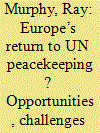

|
|
|
|
|
| Summary/Abstract |
This paper argues that Ireland has been a consistent contributor to peacekeeping since 1958 and examines how the nature of Irish participation has evolved. The maintenance of an effective UN forms a key objective of Irish foreign policy within which peacekeeping and a policy of military neutrality have come to play a central role. In 1993, Ireland revised the legal basis for participation. This brought about a fundamental change in policy, after which participation in peacekeeping not specifically of a police nature was permitted. Ireland displays evidence of both self-interest and altruism in relation to peacekeeping. Unlike many other European countries, it did not ‘withdraw’ from engagement during the 1990s. Despite greater clarity around decision-making processes in recent years, it is still difficult to discern a clear Irish policy strategy. Challenges identified for the future include the changing nature of UN peacekeeping, budget limitations and downsizing of the Defence Forces, legal obstacles to participation in non-UN approved missions, risk assessment, national caveats and a lack of clear doctrine.
|
|
|
|
|
|
|
|
|
|
|
|
|
|
|
|
| 7 |
ID:
149275
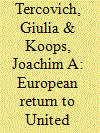

|
|
|
|
|
| Summary/Abstract |
This introductory article outlines the main rationale of the Special Issue and places the topic of the so-called ‘European Return to United Nations Peacekeeping’ in the wider context of recent policy developments and conceptual discussions related to the literature on UN troop contributions. It then outlines some of the key findings of the nine case studies (Denmark, France, Germany, Ireland, Italy, Norway, Sweden, the Netherlands and the United Kingdom) included in this issue. The article concludes that despite a recent engagement of a group of European countries in the Multidimensional Integrated Stabilization Mission in Mali (MINUSMA), expectations of a large-scale ‘return of Europe’ to UN peacekeeping are premature. While the MINUSMA experience will certainly spark important discussions and developments related to the future of UN peacekeeping and Western contributions, European countries will continue to commit only selectively troops on a case-by-case basis and only if a wide range of facilitating factors align as much as they did in the Mali case.
|
|
|
|
|
|
|
|
|
|
|
|
|
|
|
|
| 8 |
ID:
180127


|
|
|
|
|
| Summary/Abstract |
The global energy transition may have unintended consequences for businesses that provide services to the coal sector. Businesses operating in coal regions like Steve Tshwete Local Municipality (STLM) might be left stranded due to the coal phase-out. However, solar photovoltaic (PV) business opportunities can support a just energy transition. The diffusion of solar PV owing to the available grid infrastructure and solar energy resource (5.61 kW/m2/day) in STLM, South Africa positions this region as a potential solar development area. Therefore, leveraging solar PV commercial benefits for local enterprises is just. This study deployed a structured survey to understand solar business involvement and opportunities in STLM. The study found that 57.1% of businesses operating in STLM offer services to either coal mines or coal power stations. Only 14.3% of businesses were found to have offered services in the solar PV sector, signalling low participation. However, this does not mean that STLM businesses cannot increase their participation in the solar PV sector thus mitigate against potential coal phase-out socio-economic impacts. The exploratory factor analysis deployed for data analysis showed two factors (solar opportunities and regional participation) that were found to be reliable and valid on the Cronbach's Alpha test.
|
|
|
|
|
|
|
|
|
|
|
|
|
|
|
|
| 9 |
ID:
142928
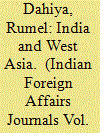

|
|
|
| 10 |
ID:
103744


|
|
|
|
|
| Publication |
2011.
|
| Summary/Abstract |
One of the aims of this article it to clarify the nature of the debate over 'civil society' and its relationship to the state. It begins by suggesting that the EU's borderland provides a context in which deep-rooted 'Western' and 'Eastern' understandings of state and civil society meet and overlap. The second section outlines the geo-political reshaping of the 'Neighbourhood'. It concentrates on the influence of non-EU actors, notably Russia, complementing the EU-focused literature on the subject. The third section elaborates the consensus in the literature on the weakness of civil society in the EU 'Neighbourhood'. This is followed by a discussion of 'Western' debates over the role and significance of civil society. This discussion suggests that the 'export' of a Western model eastwards begs many questions about which particular model is to be promoted. It concludes that the precise characteristics of state-civil society relationship remains central to the prospects for enhancing civil society co-operation.
|
|
|
|
|
|
|
|
|
|
|
|
|
|
|
|
| 11 |
ID:
101297


|
|
|
|
|
| Publication |
2010.
|
| Summary/Abstract |
Within the context of Kyrgyzstan's capital Bishkek, this article deals with an identity boundary between the so-called 'urban' Kyrgyz and Russians on the one side, and the so-called 'rural' or 'newly arriving' Kyrgyz, on the other. In the first section I discuss the ways in which this boundary is constructed among Bishkek male youth, both rhetorically as well as with regard to actual practices of social inclusion and exclusion. Starting from these insights on what 'makes' an urban identity, I try to approach the question of why this boundary might be drawn as it is. Linking a theory on 'group size' with migration data for Kyrgyzstan and the concept of 'opportunity structure', I try to examine the allocation and accessibility of opportunities such as jobs, marriage and living space - all of which can be considered to affect the current divide between ethnic Kyrgyz in Bishkek.
|
|
|
|
|
|
|
|
|
|
|
|
|
|
|
|
| 12 |
ID:
154761


|
|
|
|
|
| Summary/Abstract |
It has been more than 15 years now, but the Political turmoil and Civil unrest in Afghanistan fails to settle down. The post – truth of (the Post - American withdrawal presents a gloomy picture in Afghanistan. It would not be entirely correct to say that the Taliban Insurgency in Afghanistan has been weakened and fractured and controlled effectively.
|
|
|
|
|
|
|
|
|
|
|
|
|
|
|
|
|
|
|
|
|